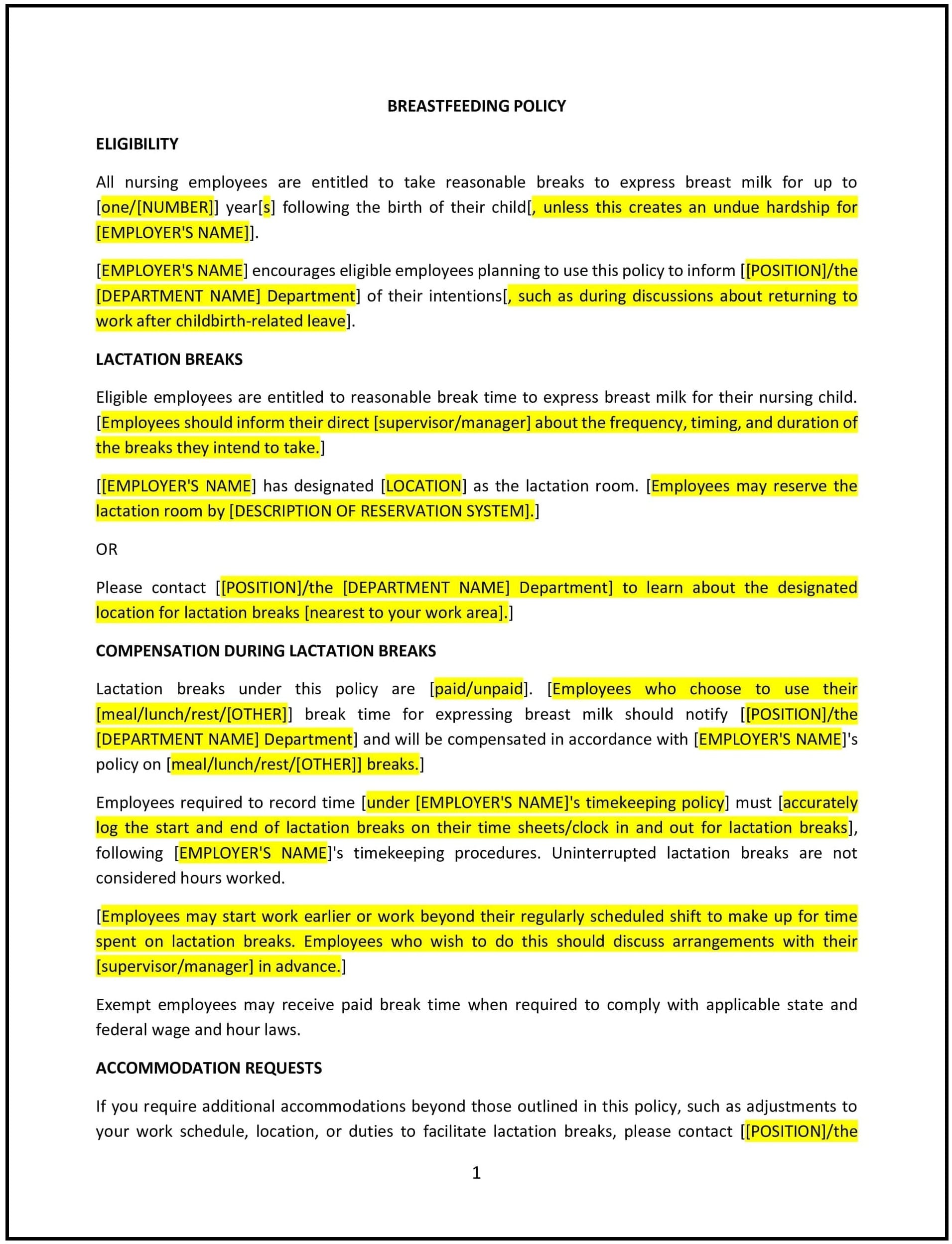Breastfeeding break policy (Wisconsin): Free template
Got contracts to review? While you're here for policies, let Cobrief make contract review effortless—start your free review now.

Customize this template for free
Breastfeeding break policy (Wisconsin)
A breastfeeding break policy helps Wisconsin businesses support employees who are nursing by providing them with adequate time and space to express breast milk during the workday. This policy outlines the company’s commitment to creating a supportive environment for breastfeeding employees, improving compliance with state and federal laws, and promoting a healthy work-life balance for new mothers.
By implementing this policy, businesses can demonstrate their commitment to employee well-being, enhance employee retention, and ensure a positive, inclusive workplace culture that supports the health of both employees and their children.
How to use this breastfeeding break policy (Wisconsin)
- Define break time for breastfeeding: Specify how much time employees will be allowed for breastfeeding or pumping breaks, and ensure that this time is reasonable and sufficient for employees to express breast milk. Wisconsin law requires employers to provide reasonable break time for breastfeeding employees, but the company may choose to provide more generous accommodations.
- Provide a private, non-bathroom space: Outline where breastfeeding employees can pump breast milk. The space should be private, secure, and free from distractions, and it should not be a bathroom. If necessary, designate a room or area for this purpose and ensure it is clean, comfortable, and equipped with a chair and electrical outlet for breast pumps.
- Set a clear process for requesting breaks: Define how employees should request breastfeeding breaks, including any notice required and how the break time will be managed. Employees should be allowed to take breaks as needed without fear of penalty or discrimination.
- Ensure flexibility: Recognize that breastfeeding needs may change over time and offer flexible break times for employees who may need more time or different arrangements as they return to work after childbirth.
- Address compensation: Clarify whether breastfeeding breaks are paid or unpaid. While federal law does not require payment for break time, some businesses may choose to offer paid breaks as an employee benefit.
- Comply with state and federal laws: Ensure that the policy complies with Wisconsin state laws and the federal Fair Labor Standards Act (FLSA), which mandates employers to provide reasonable break time and a private space for breastfeeding employees.
- Protect employee privacy: Ensure that employees' privacy is respected during breastfeeding or pumping breaks, and that information related to an employee’s breastfeeding status is kept confidential.
Benefits of using this breastfeeding break policy (Wisconsin)
This policy offers several benefits for Wisconsin businesses:
- Promotes employee well-being: By supporting breastfeeding employees, the company helps ensure that new mothers can meet their breastfeeding goals while balancing work responsibilities, contributing to better health outcomes for both mother and child.
- Enhances employee retention: Providing breastfeeding accommodations shows the company’s commitment to employees, helping to retain talent by offering supportive policies for parents returning to work.
- Reduces absenteeism: Supporting breastfeeding employees can help reduce absenteeism related to child health issues, as breastfeeding has been shown to improve the overall health of infants.
- Builds a positive workplace culture: A breastfeeding break policy promotes a supportive and inclusive workplace environment, demonstrating that the company values the health and well-being of all employees.
- Compliance with legal requirements: The policy supports the company’s compliance with Wisconsin’s breastfeeding accommodation laws and federal regulations, reducing the risk of legal challenges or penalties.
Tips for using this breastfeeding break policy (Wisconsin)
- Communicate the policy clearly: Ensure that all employees are aware of the breastfeeding break policy, particularly new mothers returning to work after childbirth. Provide information about the time and space available for breastfeeding or pumping breaks during onboarding and employee orientations.
- Provide a comfortable and private space: Designate a quiet, private room that is separate from bathrooms for breastfeeding breaks, ensuring it is adequately equipped and maintained.
- Be flexible: Understand that the needs of breastfeeding employees may change over time, and be flexible with break times or room arrangements as needed.
- Ensure privacy: Respect the privacy of employees who are breastfeeding or pumping by maintaining confidentiality and ensuring that the designated space is comfortable and secure.
- Review periodically: Regularly review and update the policy to ensure it remains compliant with Wisconsin state laws, federal regulations, and employee feedback to make sure it continues to meet the needs of the workforce.